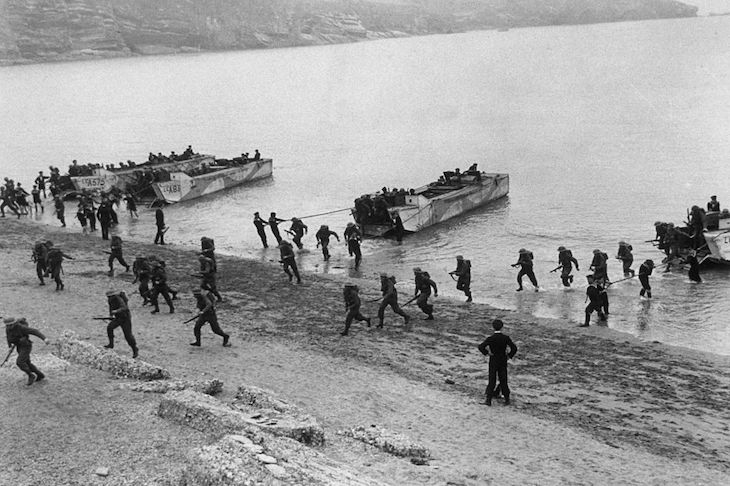Throughout 2002 and 2003 I travelled the country, and further afield, interviewing wartime veterans of the Special Air Service for my book about the history of the regiment’s early years. This adventure coincided with Britain’s march to war against Iraq and, more often than not during my discussions with these old warriors, the question of the conflict arose. Only one veteran among the scores I spoke to was in favour of Britain’s participation. The rest gave their wholehearted support to the soldiers sent to fight Saddam Hussein’s forces, but distrusted the political reasons for their deployment.
Of these men only a handful remain. I had lunch with one at the end of 2017 and although in his late 90s he was still razor sharp. One of the subjects we broached was Brexit and he explained the reasons he’d voted Leave. The previous week I’d lunched with a Royal Navy veteran of D-Day and he explained why he’d voted Remain. The pair had respected both sides of the referendum argument as they did its result.
Perhaps this is because these old timers are long past the age of working themselves into an indignant fury or, as I suspect, it’s because they are a generation with an innate respect for democracy. That’s what they fought for, what their pals died for: defending democracy against a totalitarian regime.
But there is something else, too, about that remarkable generation: they were imbued with a characteristic that has been in inexorable decline among subsequent generations of Britons. How best to describe it? A sense of right and wrong? Fair play? Perhaps, simply ‘decency’. One need only hear the juvenile cries of ‘Bollocks to Brexit’ or the ‘Nazi’ taunting of Anna Soubry, or read the rhetoric of Matt Kelly, editor of the New European, depicting Leave voters as old and incontinent, to understand what an indecent society we have become.
The SAS veterans opposed the war in Iraq because they sensed its iniquity. They were, of course, all fiercely patriotic men but that didn’t mean falling into step behind the flag if the Prime Minister bearing it spoke with a forked tongue.
I would never be so presumptuous as to speculate how those veterans might have voted in the EU referendum but I believe I can say with confidence that, as men of integrity, they would be dismayed with the dishonesty and perfidy of the last three years. However the veterans voted, they would have expected parliament to respect and obey the will of the majority. Instead, democracy has been dishonoured.
On 6 June some of those responsible, and many more who have encouraged parliament in its attempt to thwart Brexit, will bask in the nostalgic glow of the 75th anniversary commemorations of D-Day. The Prime Minister, in her last major official engagement, will be in Normandy attending a series of commemorative events including the inauguration of the British memorial in Ver-Sur-Mer. It will be an incongruous spectacle.
D-Day was about strong, bold and decisive leadership: from General Eisenhower’s decision to postpone the invasion by 24 hours because of bad weather to the deeds of soldiers as they fought their way off the beaches. Next week a Prime Minister who has come to embody weak, vacillating and untrustworthy leadership will hail the steely resolve of those men.
One of May’s MPs is Johnny Mercer, who rarely misses an opportunity to remind us he is a former army officer. Last November he tweeted about the importance of Remembrance Sunday, captioning a photo of a second world war veteran with the words: ‘Freedom isn’t free’. What a shame Mercer was unable to summon up the courage to defend Sir Roger Scruton’s right to free speech last month, instead calling for his removal. To his credit, Mercer is one of the few parliamentarians to take a stand against the institutional hounding of former and serving soldiers by MPs, civil servants and human rights lawyers, usually on charges of misconduct that are subsequently proved false.
Also participating in the D-Day anniversary events will be the council leader of Portsmouth, Gerald Vernon-Jackson, a Liberal Democrat who ardently endorses his party’s ambition to overturn Brexit. When he heard that the president of the USA – the country that suffered more casualties than any other on 6 June 1944 – would honour his city with a visit to mark the anniversary, he was furious. ‘We don’t want to see Trump in Portsmouth,’ he told his local paper. ‘His visit has changed things dramatically for D-Day 75 and has ruined things for the people of Portsmouth.’
It’s the brazen hypocrisy of these people that’s so nauseous. Like that of Owen Jones, also bitterly opposed to the visit of the American president. ‘D-Day was about the conquering of the forces of racism and fascism in the continent of Europe,’ the Guardian columnist told the BBC last month when asked why the President should not be welcomed. ‘We are seeing today the far right at its strongest that its ever been and the man most… associated with legitimising the far right internationally… is president Donald J Trump.’
While Jones cited racism and fascism as among the Nazis’ crimes, he failed to mention anti-Semitism, now so prevalent within the European left. And, as the New York Times showed recently when it published an appalling cartoon, it’s also becoming fashionable on the American left. Trump has his flaws but an anti-Semite he is not, unlike many within the Labour party.
If anyone should be unwelcome at the D-Day commemorations it’s the anti-Semites and the anti-democrats, those who wish not only to control what we say, but how we vote. That, should we need reminding, is what we fought to defeat in 1944.







Comments